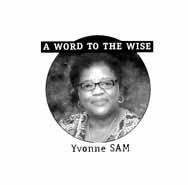
Black History month may be over, but the woes of Black people are far from over.
I find that our seemingly endless conversations about what Black people need to have and need to do are nothing short of astounding, and confounding as well, to say the least. Some of our people call radio talk shows, write newspaper articles and decry, lament, and complain about the lack of resources among Black folks. Others ask “how to” and “when” questions about issues, initiatives, and strategies “we need” to implement and champion. Even when the on-air host provides the answer, some callers ignore it and go on another tirade about another issue, another deficiency, or another “Black people problem” and what “we need” in order to change our situation.
Surprise! Surprise! But the answers are staring us right in the face. Seeking internal instead of external relief, and relying on our own resources, is the practical way to solve most of our problems.
Myopia is a deficiency of the eye, the inability to see clearly from a distance (in our case, the lack of foresight). Believe it or not, looking for, rather than using what we already have has pushed us further down the economic ladder. Many of our so-called community leaders have come to depend on others to fund their organizations and causes, thus causing them to be nothing more than little children who can be patted on the head and made to sit down, stand down, and shut up any time it suits the patriarch’s agenda. Surprise again, but we have a tremendous amount of resources at our disposal, yet we continue that sad refrain, “we need” this and that, without utilizing what we already have. That’s a prescription for failure, brothers and sisters. Aren’t we tired of failing? Isn’t it time we chalked up a few wins?
It is well-known that the world over fears and respects power; that’s why you hear the terms “Buying Power” and “Voting Power.” These terms, however, are just euphemisms when applied to Black people.
Tell me I am misguided, but if it were not true Black folks would be well beyond the economic and political position we’re in today. Power is not power unless it is utilized. Otherwise, how would any group ever know it had power? Consumerism must be purged from our minds if we are to make any form of progress.
We’re always complaining about finances, yet we spend our money in the shops of those who will not hire us, or our children.
It may be no secret, or a lesser-known fact, but the Black churches here collectively generate millions per year. With this infusion of cash into institutions that vows to lift the mental acuity and spiritual zeal of Black people, why do so many Black congregants continue to find themselves struggling?
I was in a conversation the other day with a lady who makes pastries and other West Indian culinary delights, she went on to explain that every time there is a church function she eagerly brings her goods to the church as donations for the occasion at hand. Yet she can count on one hand the percentage of members of the church who are patrons of her business. The answer is right in front of our faces; we fail to act in a reciprocal manner.
It is clearly stated in the Good Book to bring your tithes and offerings to the storehouse, but at the selfsame time it also says, “Do unto others as you would have them do unto you.”
So are we saying that the attitude of the church is separate from the individual teachings of the Bible? Does this mean that churches can operate separate from behaving like an individual?
We fail to understand that churches are not buildings and pews; they are people. Knowing this, we should also know that the church should behave similarly to Jesus. Its focus should be to enrich and lift the people, so the people can enrich and lift the church.
Again, the solution is right in our faces. The church should tap members of their congregation for services that they need before opening the opportunities to the general public. From time to time churches hold various fundraising events, and the venues are those owned by the very people who you claim are your oppressors.
I also believe that it is irresponsible for churches to only focus on extracting the 10% of earnings from its members without having regular discussions on what members should be doing with their other 90%. You see there are many churches that are being run like a business and by financially astute persons.
Churches should explain practical applications on how members can reap what they sew (sow) into the church, instead of the inspirational speeches filled with platitudes and rhetoric. Again, the answer is staring us right in our faces.
Should not the congregants be taught how to sell themselves and build revenue for themselves just how the pastor sells himself and the teachings of God every Sunday?
Do not misunderstand me. I absolutely believe a pastor should be taken care of by his flock. However, I believe that we also need to ensure pastors do not confuse “care” with greed, while we all wallow in our self-induced demise. Neither am I asking the church, or any pastor for that matter, to lay the groundwork of their strategic spiritual development. No Way! I am just proffering simple ways of resorting to our own resources, finding simple solutions that would serve as the ace staring us in the face. By this I am asking that churches make reciprocal investment in their members a top priority, just as they expect the members to make it a priority placing theirs in the church.
It seems only fair, and a practice that would be mutually beneficial to both the church and the “people.”
We must stop looking for what we already have. We have the cards in our hands and the Ace is staring us in the face (in fact it always has been).
















